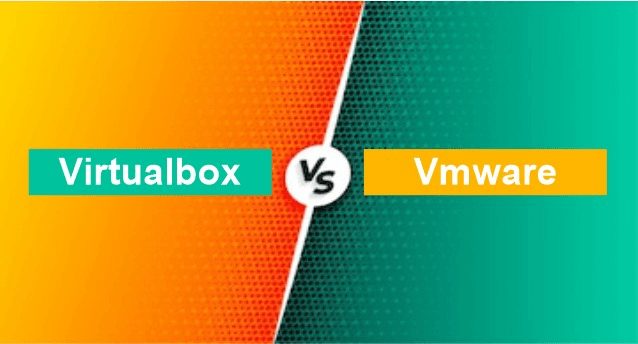Difference between Virtualbox and VMwareUsually, virtualization generates a virtual variant of a device, server, network, or storage device. Virtualization allows users to generate virtual machines. Furthermore, a hypervisor is software that may create and handle virtual machines. VirtualBox is a free and open-source hypervisor, whereas VMware is an organization that offers various software and apps for virtualization. Both systems are quick and dependable, with several unique features. Some of these features are similar to both platforms, while others are unique. It could be difficult to select between Oracle VirtualBox and VMware virtualization solutions. In this article, you will learn about the difference between Virtualbox and VMware. But before discussing the differences, you must know about Virtualbox and VMware. What is Virtualbox?A virtual machine emulates a computer with features comparable to a real computer. Virtual machines can be created and run with the assistance of a hypervisor or VM monitor. So, it is a free and open-source hypervisor platform which was designed and developed by Oracle Corporation. It allows the design and management of virtual computers on OS like Linux, Windows, macOS, and Solaris. For some guest OSs, it also offers a "guest extras" package of device drivers and system programs to boost performance. VirtualBox enables users to install numerous guest OS on a single host OS. Each guest OS could be started, paused, and stopped individually within its virtual computer. Furthermore, the user may set up each VM separately and execute it as software-based or hardware-based virtualization. Configurations allow guest OS to interact with one another. Moreover, the host and guest OS may interact via a virtual network. Features of VirtualBoxThere are various features of VirtualBox. Some features of the VirtualBox are as follows: 1. Open-source and Free It is open-source and free software that may run on virtually any host OS. 2. No hardware virtualization needed It doesn't necessitate the usage of hardware virtualization. As a result, VirtualBox may run on older hardware that lacks functionality, such as Intel VT-X. 3. Portability VirtualBox is portable and works on both 32-bit and 64-bit OS powered by Intel x86-64 CPUs. VirtualBox is a type 2 hypervisor, and it operates in the same manner on all host systems. 4. Guest additions These are software programs that are loaded on approved VirtualBox guest VMs to enhance performance and offer more integration and host system connectivity. 5. Great hardware support VirtualBox supports guest SMP, multiscreen resolution, built-in iSCSI compatibility, USB devices, complete ACPI support, and PXE network boot. 6. Virtual machine groups Users may use this feature to organize virtual machines both individually and collectively. Start, reset, save state, close, stop, shutdown, power off, and other actions may be performed on VM groups in the same way they may be on individual VMs. What is VMware?It is a hypervisor software that was developed and designed by VMware, Inc., Palo Alto(California). It is installed on a physical server and enables the various OS to execute on a single server. All VMs on the same physical server transmit resources like the main memory and networking. A few of VMware's products include virtualization, software-defined data centre software, networking and security management tools, and storage software. Its virtualization products have become crucial to every company's IT infrastructure. Features of VMwareThere are various features of VMware. Some features of VMware are as follows: 1. Multi-Cloud Environment The VMware Cloud Operating Model (VCOM) is a framework that connects your business, cloud strategies, and application to enhance performance, agility, and control in a multi-cloud environment. It combines processes, people, and technology to enable operations, uniform service delivery, and governance for the present and the future, regardless of workload location. VMware multi-cloud solutions help to standardize operations and architecture over public cloud, private cloud, and edge environments. 2. Personal Desktop It enables users to operate virtual machines (VMs) on a Windows or Linux desktop. These VMs execute alongside the physical machine. Each virtual machine executes its own OS, which may be Windows or Linux. Users may use the native OS to perform the Windows on a Linux workstation or vice versa. 3. Virtual Cloud Network A Virtual Cloud Network enabled by VMware NSX offers a seamless, more secure software-defined networking layer from the data centre to the cloud to the edge. It builds a network architecture that covers the complete network, extending intrinsic policy consistency, security, automation, and simplifying hybrid processes. 4. Disaster Recovery Management VMware Site Recovery Manager (SRM) is a disaster recovery management solution that enables administrators to establish recovery plans that are automatically executed during a system failure. Site Recovery Manager (SRM) allows administrators to automatically handle VM failover and failback. 5. Digital Workspace VMware Workspace ONE is a digital workspace platform that is powered by intelligence that integrates the management of all your end-user environments. It promotes user autonomy and flexibility. Key differences between Virtualbox and VMware
Here, you will learn about the various key differences between Virtualbox and VMware. Some main differences between Virtualbox and VMware are as follows:
Head-to-head comparison between the Virtualbox and VMwareThe operating system has various head-to-head comparisons between Virtualbox and VMware in the operating system. Some comparisons between Virtualbox and VMware are as follows:
ConclusionVirtualBox and VMware are both connected to virtualization. The primary distinction between VirtualBox and VMware is that VirtualBox is a free and open-source hypervisor which Oracle Corporation creates. In contrast, VMware is a cloud computing and platform virtualization software and services, provider. |
 For Videos Join Our Youtube Channel: Join Now
For Videos Join Our Youtube Channel: Join Now
Feedback
- Send your Feedback to [email protected]
Help Others, Please Share










